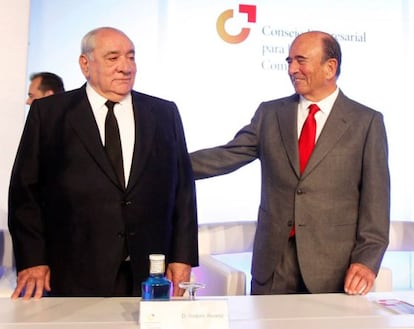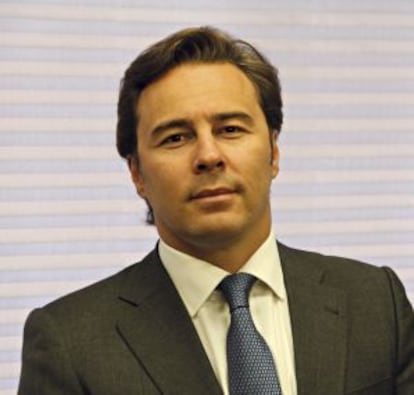The man who turned El Corte Inglés into a symbol of modern Spain
The death of longtime chairman Isidoro Álvarez marks a turning point for the department store chain

Only five days separated the deaths of two of Spain’s leading businessmen. Emilio Botín, the emperor of Spanish banking, was survived for less than a week by Isidoro Álvarez, the country’s emperor of retail distribution. Both were 79 years old.
Álvarez, the chairman of El Corte Inglés, died on Sunday at Puerta de Hierro University Hospital in the Madrid satellite town of Majadahonda, where he had been admitted with breathing problems on Wednesday, the day that the chairman of Banco Santander passed away.
According to a company statement, Álvarez died of “unexpected heart failure” after initially showing an improvement in his respiratory troubles.
Under his guidance, El Corte Inglés became a ubiquitous presence across Spain, a symbol of modernity, and the store of choice for many Spaniards who appreciated its long opening hours, easy return policies, and the possibility of buying everything they needed in one place. El Corte Inglés also became a part of many people’s lives, serving as a meeting point for friends, and an air-conditioned refuge from the summer heat. One of its advertising campaigns, “Ya es primavera en El Corte Inglés” (It’s already spring at El Corte Inglés), has entered the popular lexicon.
Used to working long hours, Isidoro Álvarez had begun to feel the strain in recent months
Astute, intuitive and reserved, Isidoro Álvarez was the prototype of the self-made businessman. Respected by his friends and feared by his enemies, he was just 18 when his uncle and El Corte Inglés founder Ramón Areces asked him to join the family business, then a simple tailor’s shop. The young man took up an entry-level position and quickly learned the trade, displaying great tenacity and commercial intuition.
Although he preferred hands-on training, Álvarez completed his economics and business degree at Madrid’s Complutense University at the age of 22, graduating with honors.
Two years later in 1959 he was named a board member at the company, and in 1989 Álvarez became chairman following Areces’ death.
He always disliked to be reminded of his family links to the business. “The only secret to joining the leadership of El Corte Inglés is team work,” he used to say.
Álvarez was always reluctant to expand the group internationally, preferring to focus on the national market as he believed that different nationalities have different idiosyncrasies. Nevertheless, in 2001 El Corte Inglés opened a department store in Portugal, later followed by another. Its webpage has been the tool for real international growth in the British, Dutch and Irish markets.

El Corte Inglés’ big national rival was Galerías Preciados, and Álvarez would visit both department stores incognito to take note of each one’s strengths and weaknesses. His decision to diversify into food, travel and other sectors through offshoots Hipercor, Supercor, Opencor, Bricor, Sfera, Telenor and Viajes El Corte Inglés represented a major blow to its eternal rival, which was struggling financially.
Despite longtime assurances that it would never happen, in 1995 El Corte Inglés bought out Galerías Preciados, whose flagship store was located on Madrid’s Callao square. It was the largest deal in the history of Spanish distribution.
The economic crisis that began in 2008 dealt a major blow to El Corte Inglés’ sales volumes, but the last fiscal year showed a 6.2-percent rise in consolidated profit.
Used to working long hours, Isidoro Álvarez had begun to feel the strain in recent months, and had made preparations for a change in leadership. Last year he named his nephew Dimas Gimeno director general of El Corte Inglés. Gimeno joined the company while still at university, working as a salesman while he studied law. While El Corte Inglés has not confirmed that he will be the next chairman, Gimeno is the most likely candidate to succeed his uncle.
Álvarez leaves behind a consolidated group that nevertheless needs to connect with new forms of distribution and most especially with new generations.
Tu suscripción se está usando en otro dispositivo
¿Quieres añadir otro usuario a tu suscripción?
Si continúas leyendo en este dispositivo, no se podrá leer en el otro.
FlechaTu suscripción se está usando en otro dispositivo y solo puedes acceder a EL PAÍS desde un dispositivo a la vez.
Si quieres compartir tu cuenta, cambia tu suscripción a la modalidad Premium, así podrás añadir otro usuario. Cada uno accederá con su propia cuenta de email, lo que os permitirá personalizar vuestra experiencia en EL PAÍS.
¿Tienes una suscripción de empresa? Accede aquí para contratar más cuentas.
En el caso de no saber quién está usando tu cuenta, te recomendamos cambiar tu contraseña aquí.
Si decides continuar compartiendo tu cuenta, este mensaje se mostrará en tu dispositivo y en el de la otra persona que está usando tu cuenta de forma indefinida, afectando a tu experiencia de lectura. Puedes consultar aquí los términos y condiciones de la suscripción digital.








































